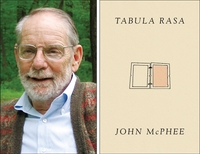In his newest (after Annals), McPhee leads readers out to the river—pole and lures in hand—to angle for American shad. McPhee knows where the fish are running, so to speak, and he opens with a tall tale about his long vigil with a giant roe shad on the line. Night falls, a crowd gathers on a nearby bridge to watch and still the fish refuses to roll over; however embellished, it's a comic story. He then probes the natural history of the shad, known as Alosa sapidissima
and traces the fish's storied place in American history and economics. The shad manages to turn up, at least in legend, at George Washington's camp at Valley Forge; it waylaid Confederate General Pickett in the defense of Richmond and hastened the end of the Civil War; it even played a minor role in John Wilkes Booth's murder of Lincoln. McPhee consults specialists like a fish behaviorist, an anatomist of fishes and a zooarcheologist who studies 18th-century trash pits to see whether Washington indeed ate shad at Mount Vernon. The author studies under a master shad dart maker and in an appendix gives recipes, too. McPhee reaffirms his stature as a bold American original. His prose is rugged, straightforward and unassuming, and can be just as witty. This book sings like anglers' lines cast on the water. It runs with the wisdom of ocean-going shad. (Oct.)


